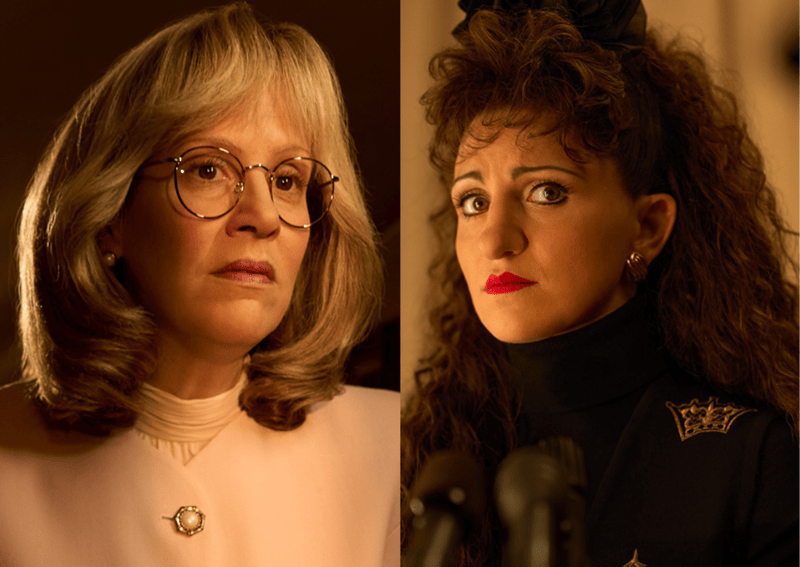FX’s Impeachment: A Study in Caricature and Misogyny
There are a lot of ways to talk about American Crime Story: Impeachment. The FX anthology series, starring Beanie Feldstein, Sarah Paulson, and Clive Owen, is an account of the executive-level infidelity that shocked the world: Bill Clinton’s affair with Monica Lewinsky. It’s an almost Shakespearean depiction of Lewinsky’s betrayal at the hands of her friend Linda Tripp, who brought the story of the affair to the FBI. It’s a peek behind the doors of the Clinton White House, giving insight into the minds of both the Clintons and their political opponents.
It’s also a study in caricature. The creators made the bizarre choice to put several of the lead actors into prosthetic bodies and facial features so over-the-top that I can’t imagine the point was to make them look more like the real people they portray. The most egregious examples are the fat suit Paulson wore to play Tripp and the fake nose Annaleigh Ashford sported in her turn as Paula Jones.
Some might say that the fat suit was merely an attempt at authenticity. The problem is, fatness is a costume Paulson can take off. The viewer knows that, and that fractures the reality of Tripp’s size and how the media used it to insult and demean her.
In one episode, Tripp reacts to John Goodman’s infamous Saturday Night Live impression of her. Goodman used his own, masculine voice to portray Tripp, all too-tight pantsuit and exaggerated double chin, playing on the easiest comedic targets imaginable to show Tripp as abominable. The SNL impression was barely about Tripp’s very real, very problematic behavior; it was mostly a misogynistic, fat-phobic condemnation of Tripp’s size. Linda Tripp was a coward, a traitor, and a bad friend—but the worst thing about her, the sketch posits, is that she was unattractive.
How could a thin actress like Paulson, in the costume of a fat suit, capture the truth of Tripp’s reaction to that impression? What’s more, how is the use of a fat suit any less offensive and demeaning than the impression itself? In a series that tries to secure audience sympathy toward Tripp, Paulson’s fat suit feels like an unnecessary flattening of her character.
Jewish actress Beanie Feldstein gives one of the only grounded performances in the cast, playing Monica Lewinsky with dignity and humanity. If the show really had any interest in centering Monica’s experience, I could get behind the funhouse mirror portrayal of the rest of the pertinent figures in the narrative (Clive Owen’s Bill Clinton nose is also glaringly bad). But Impeachment, for the most part, is about the ghouls.
It's especially disappointing that the show’s creators put less effort into dignifying Paula Jones’ victimhood than Lewinsky’s. Jones, who claimed that Bill Clinton pressured her into oral sex when he was the governor of Arkansas, was never really taken seriously by the public and never quite got justice.
Jones is played here by Annaleigh Ashford, a Tony winner and usually a delight to watch. Ashford tries her best, but her performance is stifled and caricatured by her clearly put-on, nebulously Southern accent and her big, fake nose. It’s hard not to suspect that the story is less sympathetic to Jones because she was poor, and because her pursuit of justice involved collaborating with the right-wing operatives conspiring to destroy Clinton before they had any evidence of wrongdoing.
It’s interesting that the characters portrayed by the actresses wearing prosthetics are given less narrative nuance than Lewinsky. It’s almost like the creators of American Crime Story are telegraphing the same misogynistic messages to the audience here that they’re criticizing in the media’s treatment of Monica. The more anti-Lewinsky, right-wing characters are made to look different, “ugly,” or at least “uglier” than they are in real life. Why can't they critique these women's choices or politics without implying that their morality is tied to their desirability.
When Paula Jones prepares for her nose job in episode nine, she tearfully justifies it: she didn’t know she had a “bad” nose until she was brought into the Clinton media circus and exposed to public scrutiny. I felt for her. I don’t take issue with depicting a real person’s real nose job, but placing an actress in a comically fake nose and then writing a narrative around her “fixing” it justifies the idea that there was ever something to be “fixed.” Jones herself had a perfectly normal, if prominent, nose that looks a lot more like Ashford’s natural nose than the prosthetic. Why not just let Ashford play Jones with her real nose? Maybe because there is an understanding, whether explicitly stated or not, that large noses are inherently ugly and worthy of scrutiny?
For her part, Feldstein gives a nuanced, realistic, understated performance as Lewinsky—a person long-maligned and caricatured herself. The problem is, in opposition, the giant, false facial features and over-the-top melodrama of the rest of the cast becomes the story we remember. It’s almost like Impeachment operates on two levels that never quite match up.
Feldstein, notably, is not wearing prosthetics. Neither are any of the other Jewish actors in the series (including Judith Light, Billy Eichner, and Fred Melamed, among others). It reads somewhere between vaguely and explicitly antisemitic to me that the only people with big, fake bodies and facial features in this series are white non-Jews, while the many Jewish cast members are left looking like themselves. Is this a coincidence, or are Jewish features already “exaggerated enough” to prove a point about cartoonish evil on their own?
In a series about a media circus and a trial-by-fire, maybe it’s not surprising that the creators want us to see the women who had it out for Lewinsky and the left—many of whom are still working in the fields they dominated during the impeachment, still having an impact on modern politics—as larger than life. They aren’t, though. They are real people who caused real harm. And they look just like you and me.







